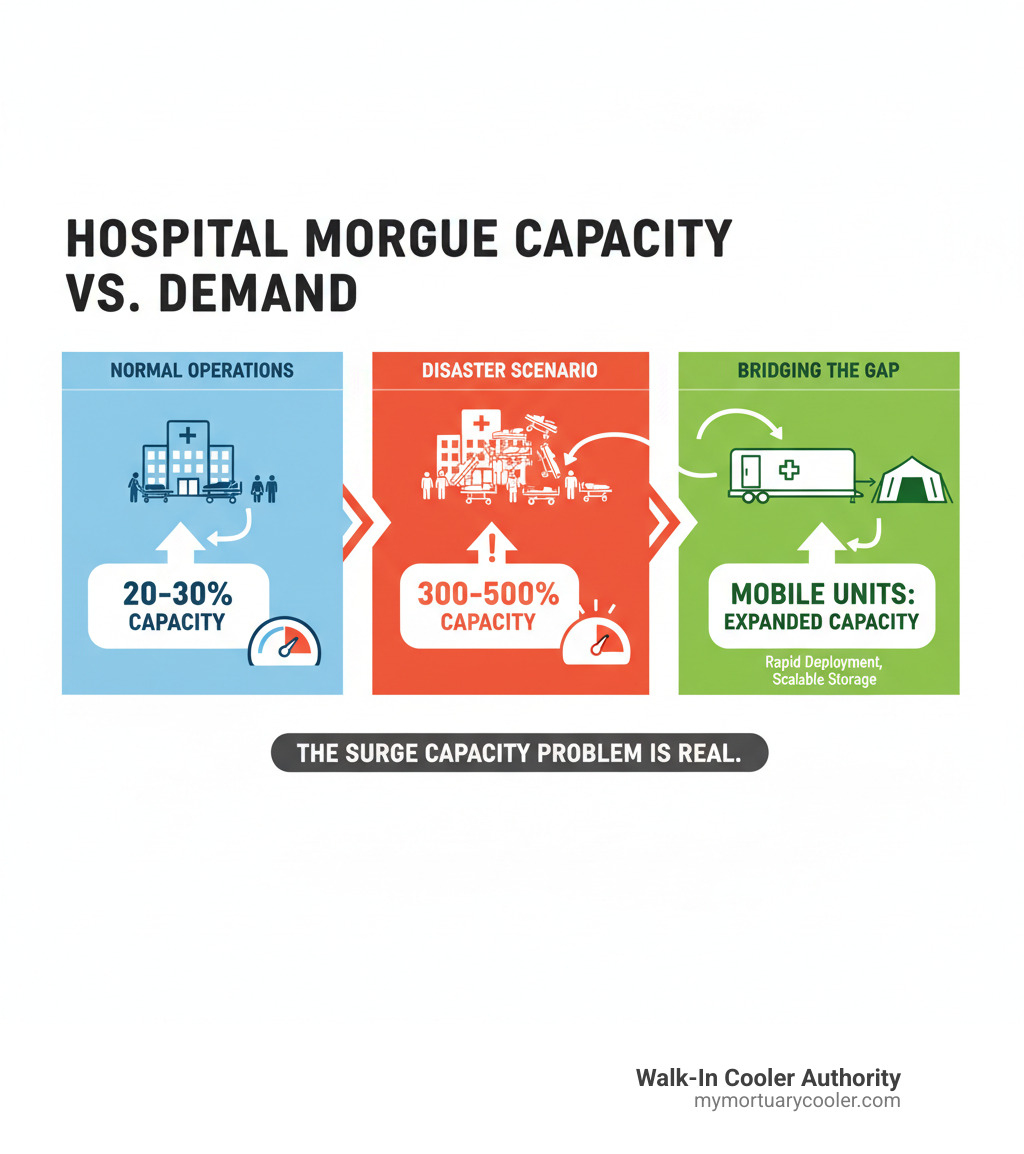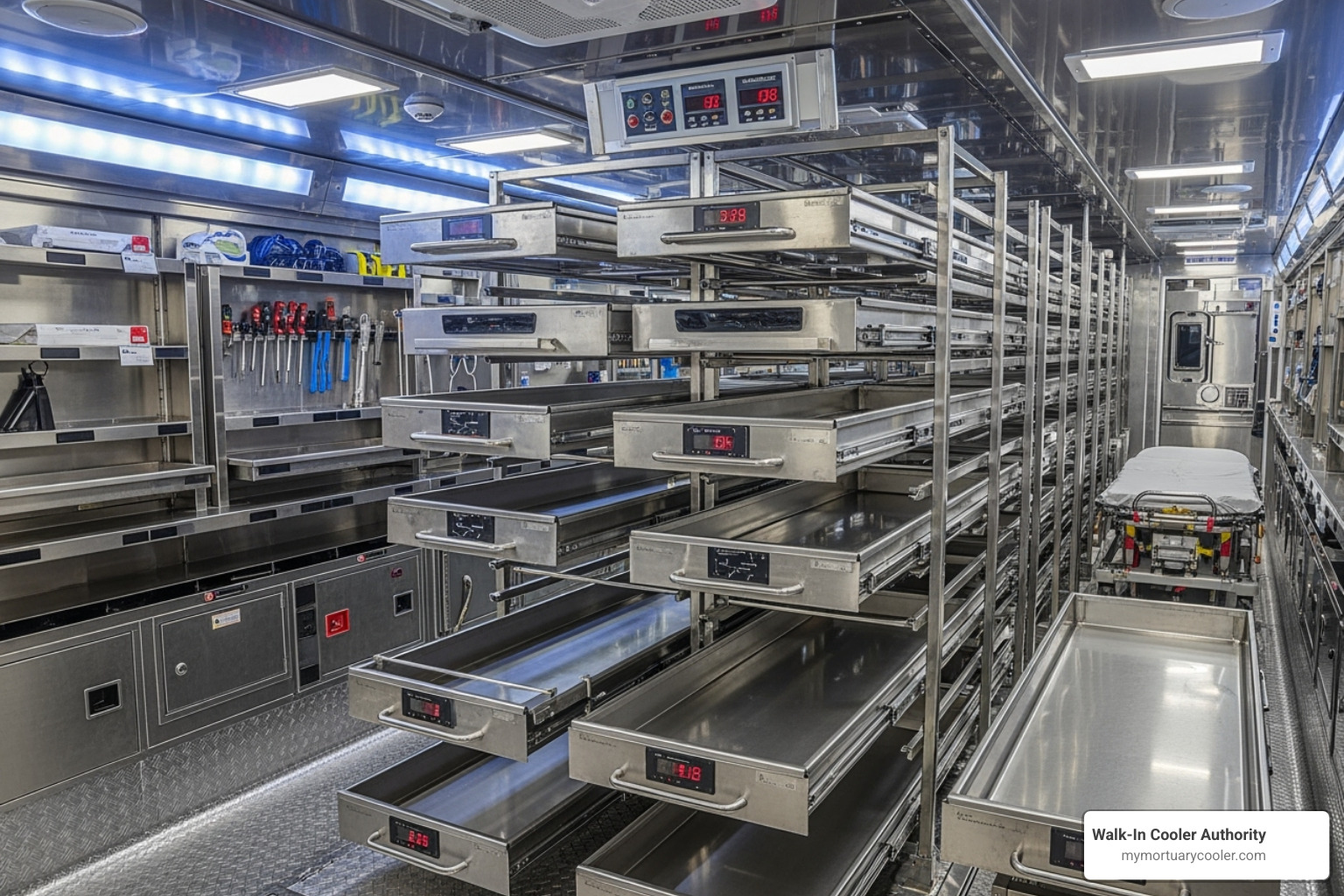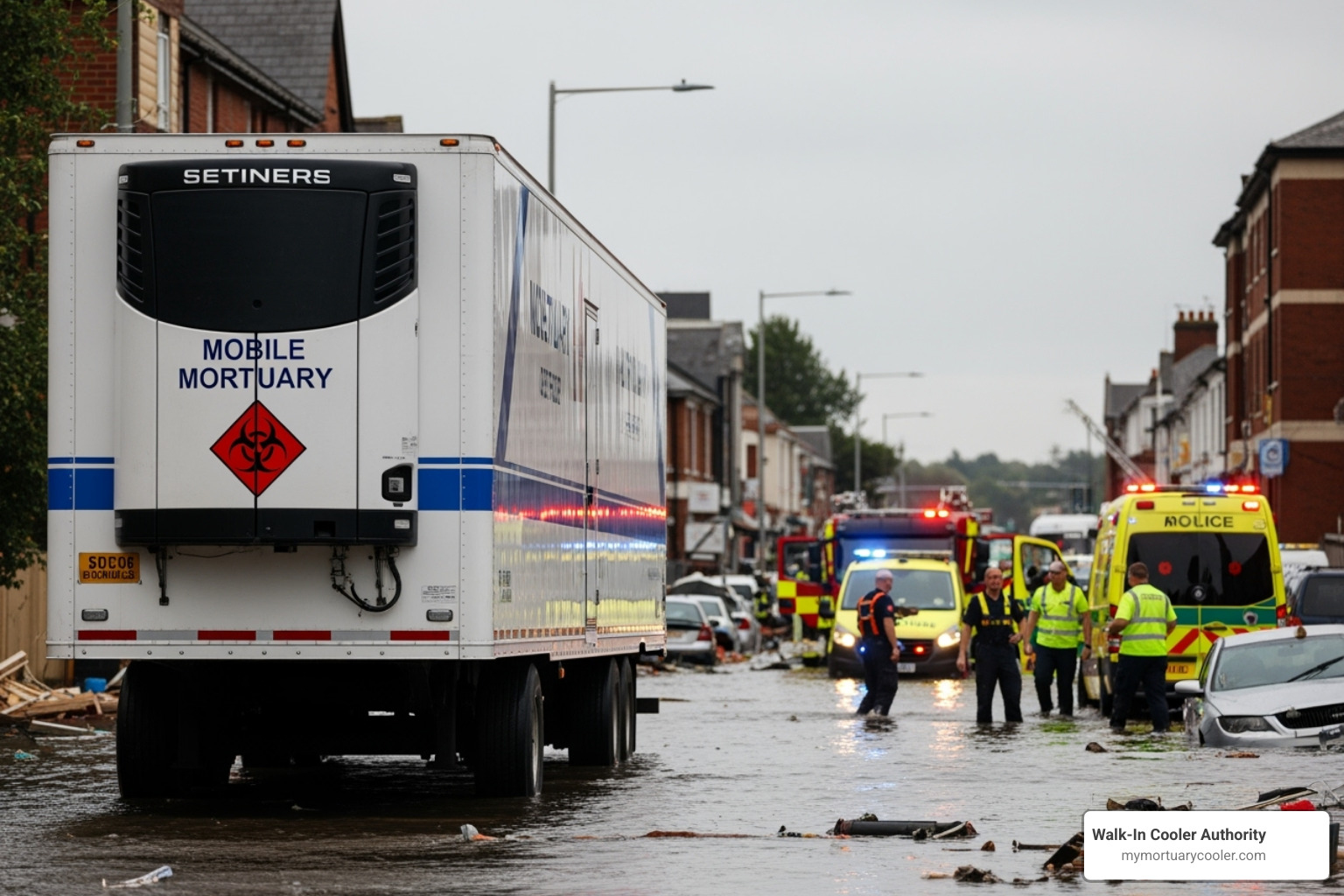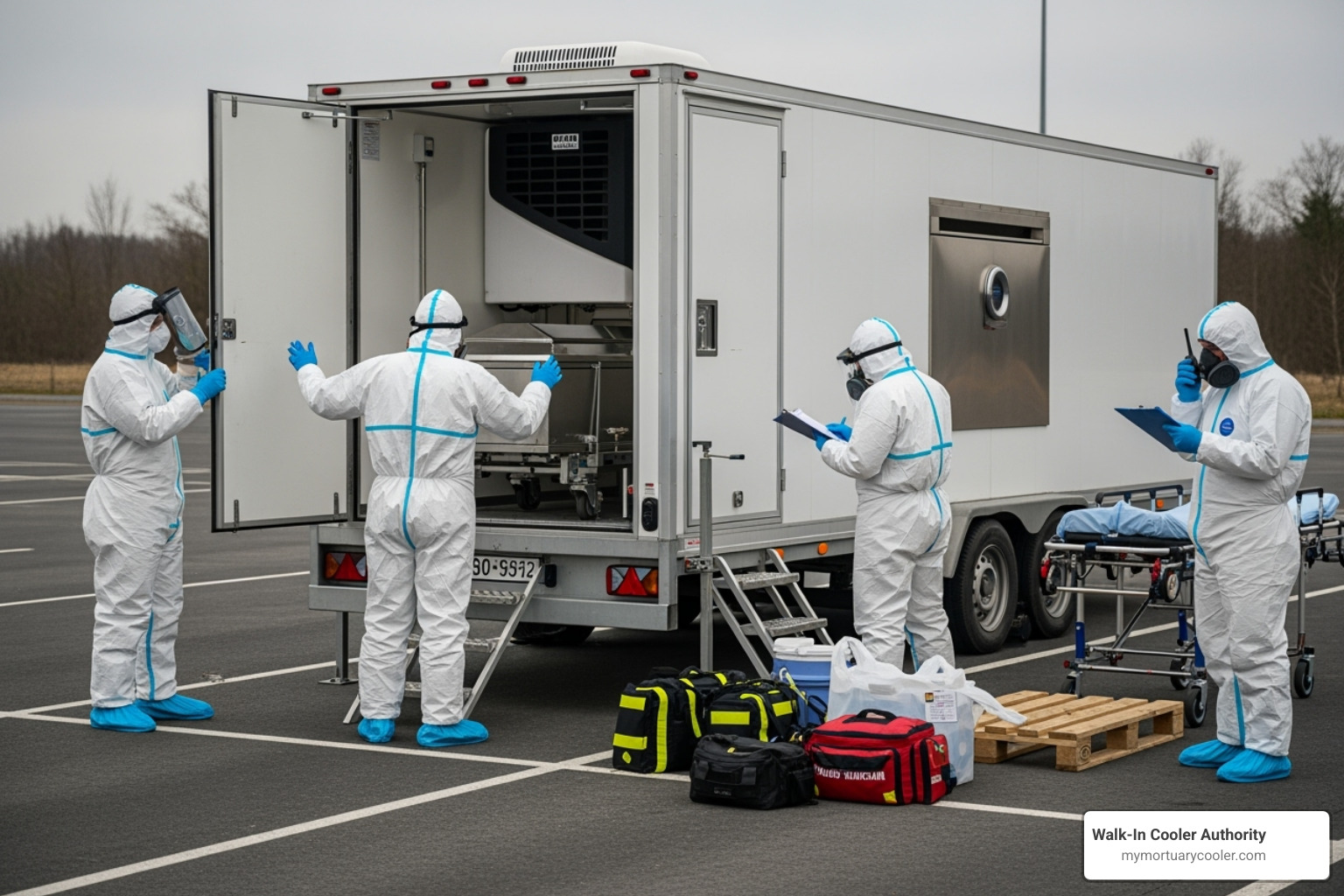Why Mobile Mortuary Units Are Essential for Emergency Preparedness
Mobile mortuary units are specialized refrigerated trailers and portable cooling systems designed to provide temporary storage and processing of human remains during emergencies, disasters, or when permanent morgue facilities become overwhelmed.
Quick Answer for Emergency Planners:
- Primary Purpose: Temporary deceased storage during capacity overload
- Deployment Time: 15 minutes to 1 hour for most systems
- Capacity Range: 4 to 90 bodies depending on unit type
- Key Applications: Pandemics, natural disasters, mass casualty events
- Technology Types: Refrigerated trailers, pop-up systems, liquid cooling units
Recent events have highlighted a critical gap in our emergency response infrastructure. During the COVID-19 pandemic, hospital morgues across the country reached capacity within days. New York City alone required dozens of refrigerated trucks to handle the surge of deceased individuals when permanent facilities became overwhelmed.
This isn't just a pandemic problem. Natural disasters like Haiti's devastating 2010 earthquake, mass casualty events, and transportation accidents can instantly create situations where the number of deceased exceeds local morgue capacity. Without proper refrigerated storage, public health risks increase dramatically, and the dignified treatment of human remains becomes nearly impossible.
The surge capacity problem is real and growing. Small rural hospitals might have morgue space for just 4-6 bodies, while urban facilities typically accommodate 20-50. When disaster strikes, these numbers become insufficient within hours, not days.
Mobile mortuary units solve this critical infrastructure gap by providing rapid deployment of additional refrigerated storage capacity. Whether it's a 16-body trailer that can be operational in 15 minutes or a sophisticated pop-up system that transforms any space into a temporary morgue, these units ensure that communities can maintain public health standards and treat the deceased with dignity during their most challenging moments.

What Are Mobile Mortuary Units and How Do They Work?
Mobile mortuary units are specialized refrigerated systems designed for the respectful care and preservation of the deceased. Unlike fixed-location morgues with limited capacity, these units are temporary, mobile solutions that can be deployed to any disaster site, hospital, or emergency location within hours. This on-site approach is critical when tragedy strikes, eliminating the need to transport large numbers of deceased individuals to distant facilities.
The science behind these units is sophisticated, with advanced refrigeration maintaining precise temperatures (typically -2°C to +5°C) essential for preservation, forensic investigations, and public health. Their flexibility is a key advantage; while a hospital morgue might hold 20-30 bodies, mobile units can scale from 16-body trailers to 90-body systems. For more details on how these solutions work, explore our guide on Refrigerated Trucks as Morgues: A Chilling Look at Emergency Solutions.
Key Components and Features of a Mobile Mortuary Unit
Every mobile mortuary unit is built with critical components to ensure a professional and dignified environment.

- Refrigeration System: The core of the unit, using energy-efficient technology to maintain precise temperatures. Advanced systems may use liquid-based direct contact cooling for faster, more efficient results.
- Insulated Panels: Thick, often fire-rated panels provide structural integrity, safety, and thermal efficiency, meeting strict regulatory standards.
- Stainless Steel Surfaces: Used for interiors and trays, these surfaces are corrosion-resistant, easy to clean, and allow for thorough disinfection to meet medical-grade hygiene standards.
- Racking Systems and Body Trays: Engineered for dignity and practicality, these systems feature smooth-gliding stainless steel trays designed to safely hold individuals while allowing easy access.
- Power Flexibility: Units can run on self-contained generators for remote deployment or connect to standard electrical supplies for long-term use.
- Security and Identification: Locking doors, safety release mechanisms, temperature alarms, and document pockets ensure security, safety, and accurate identification.
How They Facilitate Identification and Processing
Mobile mortuary units are more than storage; they are on-site processing centers that streamline mass fatality response.
They enable immediate on-site examination, allowing forensic teams to preserve evidence and begin work without delay. This creates a streamlined workflow in a single, controlled location, reducing the risk of mix-ups or lost documentation that can occur when transporting remains to multiple facilities. By bringing the morgue to the scene, evidence preservation becomes more reliable, which is critical for crime scenes and accident sites.
Most importantly, these units maintain dignity for the deceased. Professional-grade facilities shield remains from public view and provide the same level of care as a permanent morgue, giving families confidence that their loved ones are treated respectfully.
For a deeper understanding of these compassionate solutions, see our insights on Compassionate Solutions for Deceased Human Transportation.
Exploring the Types and Technology of Mobile Mortuary Units
The landscape of mobile mortuary units has evolved from simple refrigerated trucks to a sophisticated array of solutions. Key features include scalability, from 4-body units to over 90, and portability, allowing deployment wherever needed. Recent technological advancements have made these systems faster and more efficient than ever. For a quick overview, our Quick Start Guide to Mobile Morgue Solutions offers essential information.
Different Types and Capacities Available
Selecting the right mobile mortuary unit depends on the specific scenario and operational needs.
- Refrigerated Trailers: The most common solution, these portable cold rooms range from small trailers (approx. 16 bodies) for regional incidents to large trailers (up to 90 bodies) for major disasters.
- Pop-up Mortuary Storage Systems: These flexible, modular units can transform any space into a temporary morgue. Capacities range from 4 to 24 bodies, and their lightweight design is ideal for remote or hard-to-access locations.
- Liquid Cooling Systems: This cutting-edge technology uses direct contact cooling to lower body temperature much faster than traditional air circulation. Some systems are operational in under 15 minutes and can cool up to 48 bodies.
- Bariatric Solutions: Specialized units are available to accommodate larger individuals weighing up to 256kg (40 stone), ensuring dignified care for all.
| Unit Type | Capacity Range | Setup Time | Best Use Case |
|---|---|---|---|
| Trailer Units | 16-90 bodies | 30-60 minutes | Large-scale events, extended deployments |
| Pop-Up Systems | 4-24 bodies | 15-30 minutes | Rapid response, remote locations |
| Direct Contact Cooling | Up to 48 bodies | Under 15 minutes | Emergency situations requiring immediate cooling |
Technological Advancements in Modern Units
Modern mobile mortuary units feature innovations focused on efficiency, safety, and dignity.
- Direct Contact Cooling: Liquid-based systems make direct contact with remains, dramatically reducing cooling times compared to traditional cold air circulation. This is vital in hot climates or for forensic preservation.
- Rapid Deployment Systems: Modular designs and streamlined setup procedures allow some systems to be operational in under 15 minutes.
- Energy-Efficient Refrigeration: Advanced cooling systems use less power, reducing fuel costs and environmental impact during extended deployments.
- Remote Temperature Monitoring: This technology allows off-site tracking of system performance, ensuring optimal conditions and providing alerts for any issues.
- Modular Designs: Units can be configured and reconfigured to meet evolving needs, simplifying transport and storage.
- Fire-Rated Panels: High-quality units often include panels with 30-minute fire ratings, adding a critical layer of safety.
These advancements ensure that mobile mortuary units can respond effectively while upholding the highest standards. For more on refrigerated trailer capabilities, explore our guide on Refrigerated Trailers.
The Critical Role in Disaster Response and Public Health
When disaster strikes, the unthinkable becomes reality. Hospitals fill beyond capacity, emergency services stretch thin, and communities face challenges they never imagined. Among these challenges, one of the most sensitive yet critical is managing human remains with dignity while protecting public health.
Mobile mortuary units serve as the backbone of emergency preparedness, stepping in when traditional morgue facilities simply can't handle the surge. They're not just equipment sitting in storage - they're lifelines that help communities maintain their humanity during the darkest hours.
The reality is stark: most hospital morgues operate at 20-30% capacity during normal times. When disaster hits, that demand can spike to 300-500% overnight. Without proper refrigerated storage, public health risks escalate rapidly, and families lose the chance to say goodbye to their loved ones with dignity intact.

Deployment in Pandemics, Natural Disasters, and Mass Casualty Events
The COVID-19 pandemic brought this reality into sharp focus. New York City hospitals watched their morgue capacity disappear within days. The toll of coronavirus on morgues became a heartbreaking reality as dozens of refrigerated trucks lined up outside medical facilities. Healthcare workers, already pushed to their limits, suddenly faced the additional burden of managing an unprecedented number of deceased patients.
But pandemics aren't the only challenge. Natural disasters create their own devastating scenarios. Haiti's 2010 earthquake killed over 200,000 people in minutes, completely overwhelming local infrastructure. When the earth stops shaking, communities still need to care for their deceased while preventing disease outbreaks.
Mass casualty events present unique challenges too. Whether it's a transportation accident, terrorist attack, or industrial disaster, these incidents create complex crime scenes requiring careful evidence preservation. Mobile mortuary units allow investigators to work methodically without compromising the dignity of victims or the integrity of the investigation.
Transportation disasters add another layer of complexity. When a major accident occurs, especially one involving multiple jurisdictions, transporting bodies to various facilities creates confusion and heartache for families. Having mobile mortuary units on-site means everyone stays together, investigations proceed smoothly, and families know exactly where their loved ones are.
Advantages of Using Mobile Mortuary Units in Emergencies
The benefits of mobile mortuary units extend far beyond simple storage capacity. Immediate capacity expansion is the most obvious advantage - when your local morgue holds 20 bodies but you're facing 100 fatalities, these units literally save the day.
Rapid deployment makes all the difference in crisis response. Some systems become fully operational in under 15 minutes, changing any suitable location into a temporary morgue facility. This speed matters when every hour counts and communities are struggling to respond.
Maintaining dignity might seem like a secondary concern during emergencies, but it's actually fundamental to community recovery. These units provide secure, temperature-controlled environments that keep remains properly preserved and shielded from public view. Families deserve to know their loved ones are being treated with respect, even in chaos.
Supporting investigations becomes crucial in many emergency scenarios. On-site processing capabilities mean forensic teams can begin their work immediately, preserving evidence that might otherwise be lost. This is especially important for criminal investigations or disaster victim identification efforts where time-sensitive evidence could make or break a case.
Perhaps most importantly, mobile mortuary units reduce strain on permanent facilities, allowing hospitals and morgues to focus on their primary missions. Instead of scrambling to find space for bodies, healthcare workers can concentrate on saving lives. Funeral homes can continue serving families rather than dealing with overflow storage issues.
For emergency planners looking to understand their options, our guide Keep Calm and Refrigerate: Mobile Morgue Trailer Options provides practical insights into choosing the right solution for your community's needs.
When communities prepare for the unthinkable, mobile mortuary units ensure they can respond with both efficiency and compassion. Because even in our darkest hours, dignity and respect must never be compromised.
Logistics, Compliance, and Cost Considerations
Deploying mobile mortuary units requires careful operational planning, adherence to maintenance schedules and regulations, and smart budgeting. Ensuring these units operate safely and effectively is paramount.

Logistical and Operational Requirements
Smooth deployment of a mobile mortuary unit depends on several key logistical factors:
- Site Selection: The location must be accessible, private, and secure, with adequate space for the unit and personnel.
- Power and Fuel Supply: Units require a constant power source, either from on-site generators (requiring a fuel management plan) or a connection to the mains power grid. Some larger units may have specific high-voltage requirements.
- Staffing and Training: Trained personnel are essential for operating the unit, performing cleaning and maintenance, and handling remains respectfully and safely, including proper use of PPE.
- Decontamination Procedures: Clear protocols for cleaning and disinfecting the unit are mandatory, especially when dealing with infectious diseases.
- Regular Maintenance: Daily checks of the cooling system, locks, and overall condition are necessary to ensure reliability.
- Security Protocols: Strict access control and security procedures are non-negotiable to protect the deceased and any potential evidence.
- Transportation: Efficient planning is needed to transport units to the deployment site quickly and safely, whether by land or air.
Regulatory Compliance and Cost Implications
Operating mobile mortuary units involves strict adherence to regulations and careful financial planning.
Regulatory compliance is critical. This includes meeting OSHA safety standards, local health department rules for handling and sanitation, and any applicable state guidelines. All units should meet these high standards to ensure safe and respectful operation.
Regarding cost implications, organizations must decide between purchase vs. rental.
- Renting is ideal for unexpected emergencies, temporary surge capacity, or short-term needs. It provides flexibility without a large upfront investment and is a key component of many emergency rental services.
- Purchasing is a better long-term investment for facilities with frequent needs or as part of a permanent preparedness plan. While the initial investment is higher, it can be more economical over time and guarantees immediate access. When budgeting for a purchase, be sure to factor in depreciation and ongoing maintenance.
Understanding the different morgue truck options is key to making the right choice. For more help, check out our comprehensive guide: A Practical Guide to Morgue Truck Options.
Frequently Asked Questions about Mobile Mortuary Units
Here are answers to some of the most common inquiries about mobile mortuary units.
How quickly can a mobile mortuary unit be set up?
Speed is a top priority in the design of mobile mortuary units. Setup time varies by the type of unit.
Pop-up systems are designed for rapid assembly and can often be running in a matter of minutes to a few hours. Some advanced rapid-deployment systems can become fully operational, providing cooling for dozens of bodies, in less than 15 minutes.
Larger refrigerated trailer units may take slightly longer to position, level, and connect to power, but all are built for quick deployment to ensure swift and efficient readiness.
How do mobile units ensure respect for the deceased?
Dignity and respect are the cornerstone of mobile mortuary unit design and operation. This is achieved in several key ways:
- Secure, Climate-Controlled Environment: Protects remains from deterioration and unauthorized access.
- Individual Compartments: Multi-body units are equipped with individual trays or compartments to prevent commingling and ensure respectful separation.
- Proper Identification Systems: Features like document pockets or information panels help ensure accurate identification and streamline processing.
- Discreet Deployment: Units are placed in secure, private locations, away from public view to protect the dignity of the deceased and their families.
- Professional Handling Protocols: Personnel operating these units must be trained to the highest professional and ethical standards.
What are the power requirements for a mobile mortuary unit?
The power needs of mobile mortuary units are versatile to ensure reliable operation in various environments.
Many units can be powered by onboard or external generators, which is ideal for remote locations. This requires a reliable fuel supply and a refueling plan. Alternatively, units can connect to a stable mains power supply ("shore power"), which is practical for longer-term deployments near existing infrastructure.
Voltage requirements vary by unit. Smaller systems may run on a standard 115V or 220V connection, while larger-capacity units might require a more robust 380V three-phase electrical supply. It is critical to match the unit's specifications with the available power source. For generator-powered units, a solid fuel management plan is essential for uninterrupted operation.
Conclusion: Ensuring Readiness with the Right Solution
In our ever-changing world, the importance of mobile mortuary units truly cannot be overstated. As we've explored together, these specialized systems are so much more than just temporary cold storage. They are a vital part of a resilient emergency response infrastructure that every community needs.
Think about it: from providing extra capacity during tough times like pandemics and natural disasters, to ensuring deceased individuals are handled with dignity, and even helping with important investigations, their role is simply indispensable. They protect public health, maintain safety, and ensure respect, even in the most challenging situations.
Being prepared before a crisis hits is absolutely key. By understanding the different types of mobile mortuary units, the technologies they use, what's needed to deploy them, and how to stay compliant, communities and organizations can make smart choices. These choices directly help boost their readiness when it matters most.
At Walk-In Cooler Authority, we're proud to be America's trusted authority in mortuary and funeral supplies. We understand that in these critical moments, you need reliable, fast, and respectful solutions. That's why we offer direct, OSHA-compliant mortuary refrigeration and equipment. Our goal is to empower professionals like you to save big, all while ensuring you have the best tools to face any challenge.
To make sure your community or facility is truly prepared with the very best solutions, we invite you to explore our wide range of offerings. These are specifically designed for local government and emergency services. We're here to help you find the perfect mobile mortuary units that meet your specific needs and uphold the highest standards of care.
For comprehensive, same-day mobile mortuary systems custom for local government, explore our solutions today: America’s #1 Same Day Mobile Mortuary Systems for Local Government


















